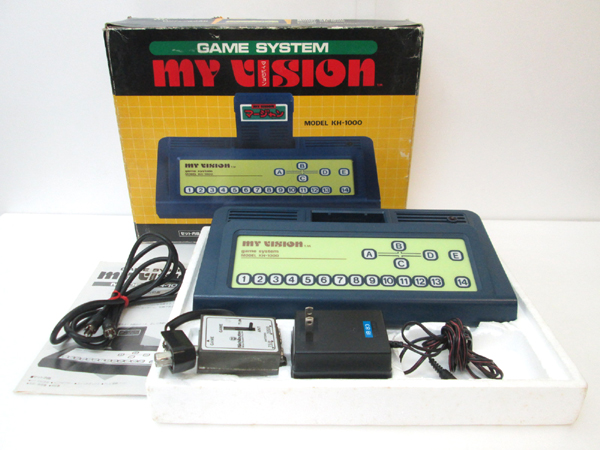History of video games/Platforms/My Vision
-
The Nichibutsu My Vision console.
History
editLaunch
editThe My Vision was launched briefly in 1983 only in Japan for 39,800 yen, and also known as the KH-1000.[1]
Preservation
editThe My Vision is supported by the open source z88DK development kit.[2]
Technology
editCompute
editThe My Vision used an 8-bit Z80 CPU clocked at 3.57 megahertz.[3]
The system had 2 kilobytes of RAM.[3]
Graphics
editThe My Vision used a Texas Instrument TMS9928 chip with 16 kilobytes of video RAM for graphics[3], and had composite and RF output.[1] The console had a 16 color palette.[4]
Audio
editA General Instrument AY-3-8910 was used for generating audio.[3] Sound was produced by a speaker inside the console.[5]
Expansion
editThe console had a cartridge slot, as well as a port for expanding Majohng games.[1] Two consoles could be linked for multiplayer over a link cable.[5]
The system used per game overlays for it's integrated keys to explain the controls.[6]
Games
editSix games were released for the My Vision, with each game costing 4,500 yen.[5]
External Resources
edit- Game Medium - My Vision page.
- Video Game Kraken - My Vision page.
References
edit| Parts of this page are based on materials from: Wikipedia: the free encyclopedia. |
- ↑ a b c "Nichibutsu My Vision". Video Game Console Library. Retrieved 23 October 2020.
- ↑ "z88dk/z88dk". GitHub. Retrieved 23 October 2020.
- ↑ a b c d "z88dk/z88dk". GitHub. Retrieved 23 October 2020.
- ↑ Manikas, Pantelis. "Nichibutsu My Vision". News & Reviews for Videogames & Gaming Consoles consall.eu. Retrieved 20 December 2020.
- ↑ a b c "My Vision by Nichibutsu – The Video Game Kraken". Retrieved 23 October 2020.
- ↑ "My Vision - Ultimate Console Database". ultimateconsoledatabase.com. Retrieved 23 October 2020.
- ↑ a b c d e f "My Vision". Wikipedia. 29 June 2020. Retrieved 23 October 2020.
